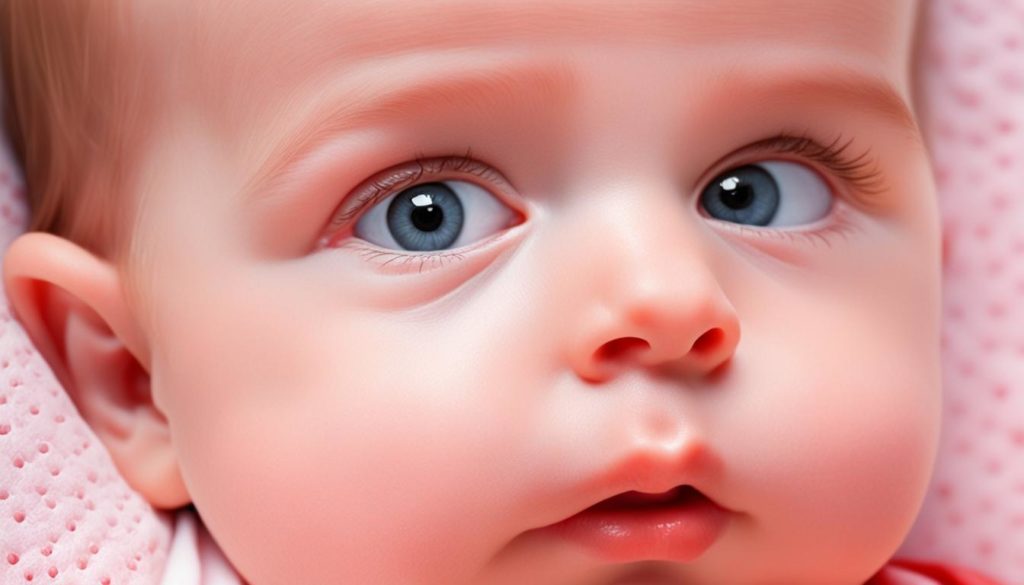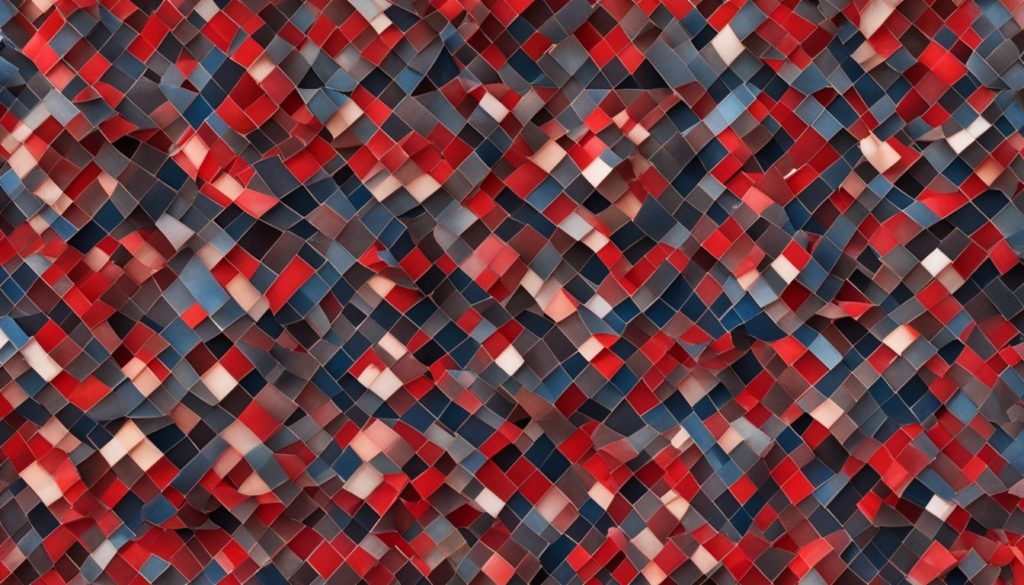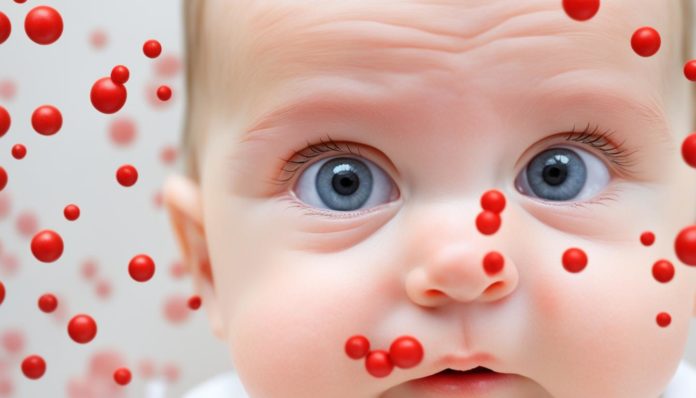Did you know about 30% of newborns and babies develop baby acne early on? It’s also called neonatal or infantile acne. This usually looks like small red or white bumps on their soft skin. Many new parents worry when they see it. But, it often goes away by itself without harming the baby. Caring for your baby’s skin right and using gentle treatments can make it better.
This guide is full of information for parents and caregivers about baby acne. You’ll learn why it happens, how to treat it, and how to prevent it. Knowing why baby acne occurs and how to handle it will keep your baby’s skin healthy.
Key Takeaways
- Baby acne affects approximately 30% of newborns and infants.
- Common symptoms include small red or white bumps on the skin.
- Baby acne is typically temporary and resolves on its own.
- Proper skin care and gentle treatments can soothe symptoms.
- Understanding the causes helps in effective management and prevention.
What is Baby Acne?
Baby acne, also known as infantile acne, affects many newborns. It appears as red or white bumps on the face and upper body. These can show up in the first few weeks after birth. Though it may worry parents, it’s usually harmless and goes away without causing discomfort to the baby.

Definition and Overview
Infantile acne looks like small, pimple-like bumps. These mostly show up on the cheeks, forehead, and sometimes the scalp and neck. It starts within the first 2 to 4 weeks of life and can last for months. Unlike teenage acne, it won’t cause scarring or long-term skin problems.
Common Symptoms
Newborn acne is seen through these signs:
- Red or white bumps
- Small pimples on the cheeks, nose, and forehead
- Pimples can also be on the scalp, neck, chest, or back
- It doesn’t itch or hurt
These symptoms are more noticeable during feeding or when the baby cries. Despite its appearance, infantile acne is mostly harmless. It doesn’t need treatment unless it’s severe or stays too long.
Causes of Baby Acne
Learning about baby acne causes aids parents in dealing with this common skin issue. We’ll look at different reasons why baby acne might show up.
Hormonal Factors
A leading cause of baby acne is hormonal influence. In the last part of pregnancy, hormones from the mother go to the baby. This can make the baby’s oil glands more active. As a result, acne might appear on the baby’s soft skin.
Environmental Triggers

Environmental factors also lead to baby acne. Things like spit-up, milk, or rough clothes can make acne worse. Keeping the baby’s skin clean and changing dirty clothes quickly helps prevent acne.
Genetic Predisposition
Family history is important in baby acne. If a parent had acne as a baby, their child might have it too. Knowing about genetic links can guide parents in caring for their baby’s skin better.
Differentiating Baby Acne from Other Skin Conditions
It’s crucial to know how baby acne differs from other infant skin issues. Baby acne usually looks like tiny red or white bumps on the baby’s face. Meanwhile, other conditions come with their own signs and ways to help.
Let’s take a closer look. This will guide caregivers in identifying and managing various skin problems properly:
| Condition | Symptoms | Treatment |
|---|---|---|
| Baby Acne | Red or white bumps, mainly on the face | Typically resolves on its own; gentle cleansing is recommended |
| Eczema | Dry, scaly patches that may itch | Moisturizing treatments and sometimes prescription ointments |
| Milia | Tiny white bumps, usually on the nose and cheeks | Generally clears up on its own without treatment |
| Heat Rash | Small, red bumps often in skin folds or areas prone to sweating | Keeping the skin cool and dry; lightweight clothing |
By spotting these differences, caregivers can better care for babies’ skin. This knowledge eases worries. It makes managing each skin issue more effective.
Effective Baby Acne Treatments
Many parents take a gentle approach to baby acne. While baby acne usually clears up on its own, some treatments can speed up recovery. They can also soothe your baby’s soft skin.
Over-the-Counter Products
There are over-the-counter products made for babies’ tender skin. These are usually mild and safe, avoiding further skin irritation. Brands like Aveeno Baby Soothing Relief Moisturizing Cream and Aquaphor Baby Healing Ointment are popular. It’s best to talk with your pediatrician before trying new products to make sure they’re safe for your child.
Natural Remedies
Many parents prefer natural baby acne remedies. Safe choices include breast milk, coconut oil, or cornstarch on the skin. These can calm irritation without harsh chemicals. Another good method is gently washing your baby’s face with a mild soap and water. This keeps the skin clean from oils and dirt. Always use fragrance-free products to avoid making the irritation worse.
When picking the right baby acne treatment for your child, the following table might help:
| Treatment Method | Pros | Cons |
|---|---|---|
| Over-the-Counter Products | Easy to use, pediatrician-approved options | Potential for minor irritation |
| Breast Milk | Natural, readily available | Requires frequent application |
| Coconut Oil | Moisturizing, anti-inflammatory properties | Possible mild allergic reactions |
| Cornstarch | Absorbs excess oil, simple to apply | Potential dryness if overused |
When to Consult a Pediatrician
Parents often wonder when they should get advice about their baby’s skin issues. Baby acne usually isn’t serious and tends to clear up on its own. But, there are times when you should see a pediatrician.
If the acne doesn’t go away after a few months, or gets worse, seeing a doctor is a good idea. Babies have very sensitive skin. The right care from a pediatrician can make a big difference. They can tell if it’s really baby acne or something else that needs a different treatment.
Here are reasons to take your baby to a pediatrician:
- Acne that’s getting worse or looks inflamed
- If there are cysts or nodules
- Acne with fever, being very upset, or signs of being sick
Getting help early and following the doctor’s advice is key to handling baby acne. A pediatrician might prescribe special creams or ointments. They can also give tips on how to keep your baby’s skin healthy.
Baby Skin Care Tips to Prevent Acne
Helping your baby avoid acne starts with proactive skin care steps. Use gentle cleaning methods, keep them hydrated, and choose the right clothes and bedding. These steps will keep your baby’s skin healthy and free from irritations.
Gentle Cleansing Techniques
To prevent baby acne, it’s important to clean their skin softly. Wash with lukewarm water and a gentle baby soap that’s free of fragrance. Don’t scrub their skin. Instead, pat it dry with a soft towel gently. This method keeps sensitive skin safe from irritation.
Proper Hydration
Keeping your baby well-hydrated is crucial for their skin health. Make sure they get enough to drink, through breast milk or formula. On the outside, apply a gentle, hypoallergenic moisturizer. This will keep their skin moist and help avoid dryness.
Clothing and Bedding Considerations
What your baby wears and sleeps on can affect their skin. Choose soft, airy materials and wash them with a gentle detergent. Make sure to keep their bedding clean and change it often. This will help protect their sensitive skin.
Here is a quick guide to remember these skin care tips:
| Aspect | Recommendation |
|---|---|
| Cleansing | Use mild, fragrance-free soap |
| Hydration | Breast milk/formula and hypoallergenic moisturizer |
| Clothing | Soft, breathable fabrics |
| Bedding | Hypoallergenic detergents and regular changes |
The Role of Diet in Baby Acne
The connection between what infants eat and baby acne isn’t straightforward. Research on this is still scarce. But, some studies hint that what a mother eats while breastfeeding can affect her baby’s skin. This points to how diet can play a role in baby acne.
When formula-fed babies get acne, parents might think the formula is to blame. Before making any changes, talking to a pediatrician is wise. They might suggest trying a different formula to see if the baby’s skin gets better.
Yet, it’s crucial to remember that baby acne usually isn’t caused by their diet. Changing what they eat might not clear up the acne. But being mindful of dietary effects on skin health is still a good idea for their overall well-being.
| Dietary Approach | Potential Impact on Baby Acne |
|---|---|
| Breastfeeding: Maternal Diet | May influence baby’s skin due to maternal intake |
| Formula Feeding: Consult Pediatrician | Alternative formulas could be suggested if skin issues persist |
| General Infant Diet | Most cases of baby acne are not diet-related |
Recommended Baby Acne Products
Managing baby acne starts with choosing the right skin care products. Products should be oil-free, non-comedogenic, and made for sensitive skin. Let’s look at some top options.
Cleansers
It’s key to use gentle baby cleansers for your infant’s skin. Choose products that are free from fragrances and harsh additives. Cetaphil Baby Wash and Shampoo or Aveeno Baby Gentle Wash and Shampoo are perfect.
Moisturizers
Keeping your baby’s skin hydrated is crucial. Use moisturizers that are light and absorb quickly. Brands like CeraVe Baby Moisturizing Lotion and Mustela Hydra Bebe Body Lotion are recommended.
Specialized Baby Acne Treatments
If baby acne persists, specialized treatments might be needed. Look for products with zinc or erythromycin to reduce inflammation. Always get advice from a healthcare provider before using these treatments.
| Product Type | Recommended Brand | Key Features |
|---|---|---|
| Cleanser | Cetaphil Baby Wash and Shampoo | Fragrance-Free, Hypoallergenic |
| Cleanser | Aveeno Baby Gentle Wash and Shampoo | Fragrance-Free, Hypoallergenic |
| Moisturizer | CeraVe Baby Moisturizing Lotion | Lightweight, Easily Absorbed |
| Moisturizer | Mustela Hydra Bebe Body Lotion | Free from Harsh Chemicals |
Conclusion
Baby acne is a common, non-serious issue many newborns face. It often goes away as the baby’s hormones balance out. Parents should focus on soft skin care. This means washing the baby’s face with warm water and keeping the skin dry.
Avoiding harsh treatments and products is crucial. Monitor your baby’s skin and talk to a doctor if the acne doesn’t improve. Patience and the right care are important in handling baby acne. For extra info on this topic, you can click here.
Knowing that baby acne is usually not a big deal can ease parents’ worries. Use gentle skin care methods, stay updated on treatments, and know when to get medical advice. Caring for your baby’s skin properly can help manage acne and keep their skin soft and healthy.
FAQ
What are the common causes of baby acne?
Baby acne is often caused by hormone changes at the end of pregnancy. It can also come from irritation by spit-up, milk, or fabrics. Sometimes, a baby’s genes make them more likely to get acne.
What does baby acne look like?
It looks like small red or white pimples on a baby’s face or body. You can see it on the cheeks, forehead, sometimes the scalp, and neck. It shouldn’t hurt or itch for the baby.
How can I differentiate baby acne from other skin conditions?
Baby acne shows as tiny bumps, while milia are small white cysts. Eczema appears as dry, flaky patches. Knowing the difference helps treat each condition correctly.
What are effective treatments for baby acne?
Baby acne usually clears up on its own. Gentle over-the-counter products can help. Natural options like breast milk or coconut oil might work too. But, stay away from harsh chemicals and perfumes.
When should I consult a pediatrician about my baby’s acne?
See a pediatrician if the acne worsens, lasts long, or if there are other symptoms. They’ll diagnose and suggest treatments. They can also offer skin care advice to prevent future issues.
How can I prevent baby acne?
Keep your baby’s skin care gentle. Use mild soap and don’t scrub hard. Keep their skin dry and moisturized. Choose soft, breathable clothes and use hypoallergenic detergents.
Is baby acne related to diet?
There’s little proof that diet causes baby acne. But, breastfeeding moms might watch their diet. For bottle-fed babies, talk to a doctor about formula concerns. Usually, diet isn’t a factor.
What products are recommended for treating baby acne?
Use gentle, fragrance-free products for sensitive skin. Non-comedogenic cleansers and moisturizers are best. For tough cases, look for zinc or erythromycin products, with a doctor’s advice.


